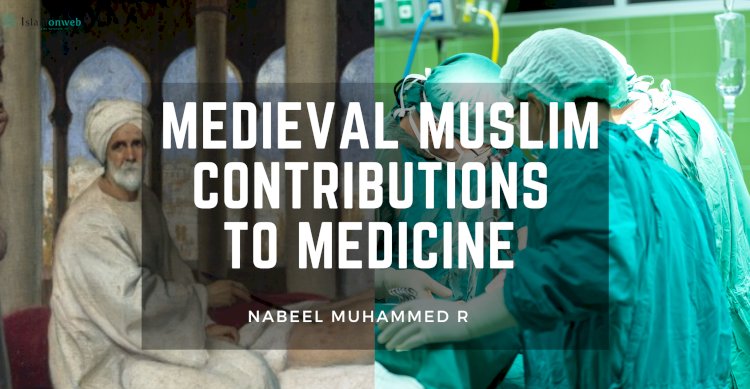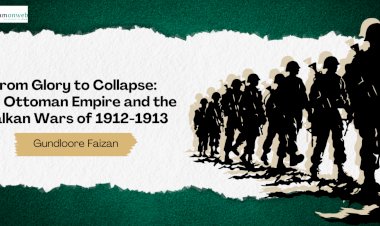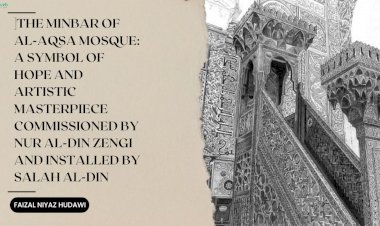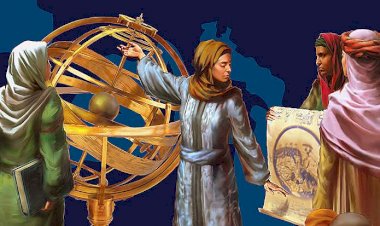Medieval Muslim Contributions to Medicine: Pioneering Muslim Scientists
Advances in medicine have always been a crucial necessity, and while modern medical science is often associated with developments in the West, its foundation is deeply rooted in the contributions made by Muslim scientists. These scholars not only preserved ancient knowledge but also expanded and refined it through rigorous research and experimentation, elevating medicine to new heights. Their contributions were monumental and left an enduring impact on society.
Islam encompasses every aspect of human life, making it a comprehensive way of living. It encouraged its followers to seek knowledge, which led medieval Muslim scholars to excel in various fields, including science, technology, medicine, astronomy, translation, mathematics, and more. It is widely recognised by scientists, philosophers, and notable figures that Muslim contributions played a critical role in shaping and advancing the scientific and technological achievements we benefit from today.
Despite this, there is a tendency in Western narratives to overlook the role Muslim scientists played in the historical development of medical science. However, the truth remains that Muslims carried the torch of scientific inquiry during an era when no other civilisation was capable of doing so.
The contributions of Muslims to the invention of various drugs and therapeutic agents are vast and significant. These advancements laid the foundation for today's pharmaceutical industry. Among the most prominent figures of the Islamic Golden Age in the field of medicine were Zakariyya al-Razi, Ibn Sina, Rabban al-Tabari, and Al-Zahrawi. These preeminent medical scientists revolutionised the understanding and practice of medicine, influencing generations to come. Their work continues to be recognised for its impact on both traditional and modern medical sciences.
Zakariyya al-Razi (Rhazes)
Abu Bakr Mohammad ibn Zakariya Al-Razi, known in the West as Rhazes, was born into a Persian Muslim family in the ancient city of Rey, located on the southern slopes of Tehran. The exact year of his birth remains a matter of debate among scholars, with estimates ranging from 841 to 865 A.D. Al-Razi was one of the towering figures in the history of medicine, as well as a celebrated alchemist and Muslim philosopher. His extensive contributions spanned various fields, and he authored over 200 manuscripts, many of which left an enduring impact on medical science.
Al-Razi’s advancements in medicine were pioneering, particularly in terms of his meticulous observations and discoveries. His greatness has been acknowledged by many scholars, including George Sarton, an eminent Belgian-American historian of science, [1]who wrote in his Introduction to the History of Science that Al-Razi was "the greatest physician of Islam and the Medieval Ages."[1]
Among his most famous works are Al-Hawi (The Virtuous Life) and Kitab al-Mansuri (The Book Written for the Samanid ruler Mansur ibn Ishaq), both of which gained global recognition. Al-Razi was the first to differentiate between smallpox and measles, and his book on smallpox remains one of the most comprehensive studies on the subject, later translated into English. He was also the first to write a book on pediatric diseases and to discuss neuropsychiatric conditions, successfully treating mental disorders such as lovesickness and lycanthropy[1].
Al-Razi introduced innovative treatments for conditions like poisonous insect bites, using tourniquets to stop blood flow and techniques such as sucking or cupping to remove poison. His pioneering use of emetics to induce vomiting as a treatment for ingesting poisonous substances marked a significant advance in toxicology. [2]He was also the first to describe allergic asthma and made foundational contributions to the field of allergy and immunology.[2]
Moreover, Al-Razi played a vital role in establishing and managing hospitals in Baghdad and other cities. He wrote extensively on the treatment of paralysis, epilepsy, and hydrocephalus (enlargement of the head). Al-Razi also advocated for the use of honey as a natural medicine, recognising its importance in both simple and composed remedies.
Ibn Sina (Avicenna)
Ali al-Husayn ibn Abdullah Ibn Sina, born around 970 in Bukhara (now Uzbekistan) and passed in 1037 in Hamdan, Iran, is widely regarded as the father of early modern medicine. He was an extraordinary physician and philosopher in the Islamic world, and his impact on medical science is still felt today. Ibn Sina memorized the Quran by age 10 and quickly surpassed his tutor, Nātilī, who instructed him in elementary logic. By the age of 16, he had shifted his focus to medicine, a subject he claimed to have mastered with ease. His remarkable writing career began at the age of 21, with around 240 works attributed to his name.
Among his most famous works are Al-Shifa (The Book of Healing), a scientific and philosophical encyclopedia, and Al-Qanun fil Tibb (The Canon of Medicine), a medical encyclopedia that remained a standard reference in both the Islamic world and Europe for centuries. The Canon of Medicine, traditionally divided into five volumes, surpassed the earlier works of Al-Razi, such as Al-Hawi and Al-Mansuri, in both fame and usage. This comprehensive text was a required textbook in European medical universities as late as the 17th century and continued to be influential in both the East and the West until the 19th century.
The Canon of Medicine is renowned for introducing systematic experimentation and quantification in physiology, as well as identifying contagious and sexually transmitted diseases. It also outlined valuable public health measures to prevent the spread of infectious diseases. [3]Avicenna's work pioneered several fields, including experimental medicine, clinical trials, neuropsychiatry, risk factor analysis, and the introduction of the concept of syndromes in diagnosing specific diseases[3]. His contributions to pharmaceutical sciences included evidence-based medicine, clinical pharmacology, and experimental medical research.
Ibn Sina was a trailblazer in the study of pulsology (the study of the pulse) and sphygmology (the study of pulse and blood pressure). He was also the first to describe the surgical procedure of intubation to facilitate breathing, a method that laid the groundwork for later surgical innovations. (4)Avicenna was instrumental in recognising and describing cancer as a tumour and provided the first known treatments for cancer(4). His systematic and holistic approach to medicine contributed to the understanding of various diseases, including distinguishing mediastinitis[2] from pleurisy[3] and describing conditions related to skin, perversions, and nervous ailments.
Ali Rabban Al-Tabari
Abu Hassan Ali Bin Sahl Rabban Tabari, born in 839 AD in Mazanderan (Tabaristan), Iran, was a remarkable figure in early Islamic medicine. Born into a respected Jewish family, his father, Sahl, was a renowned physician who also excelled in astronomy, philosophy, mathematics, and literature. Ali's education in medical science began under his father's guidance. In addition to his medical training, Ali Rabban Al-Tabari was exceptionally skilled in multiple languages, mastering Arabic, Persian, Syriac, Hebrew, and Greek, which significantly contributed to his scholarly pursuits.
Recognised for his wisdom, intellect, and administrative abilities, Ali Rabban was recommended to the ‘Abbasid Caliph Al-Mu'tasim and was summoned to serve at the court in Baghdad. He quickly became a trusted confidant of the Caliph and was appointed as his diwan scribe. After the death of Al-Mu'tasim in 842, Al-Mutawakkil, the new caliph, retained Ali Rabban at the court, where he served as the Caliph's private physician. At the age of seventy, Ali converted to Islam.
(5)Ali Rabban Al-Tabari made substantial contributions to medical science, being the first to record Indian medical knowledge, particularly from the works of Sushruta and Charaka(5). His most famous work, Firdaus al-Hikmah (The Paradise of Wisdom), is the oldest surviving encyclopedia of medicine and stands as a testament to his broad knowledge in the field.
One of his notable contributions was in ophthalmology, where he extensively documented eye diseases, their diagnosis, and treatment methods. His expertise also extended to surgery, where he authored detailed treatises on various surgical techniques, including procedures for treating injuries, fractures, and wounds.
Apart from his clinical achievements, (6)Al-Tabari is renowned for advocating a holistic approach to healthcare, emphasizing the importance of preventive medicine, dietary habits, and lifestyle choices(6). His work laid the groundwork for many future developments in medical science, combining practical knowledge with a vision of health that considered the overall well-being of the individual.
Al-Zahrawi (Albucasis)
Abu Qasim Khalaf Ibn Abbas Al-Zahrawi, known in the West as Albucasis, was born in 936 AD in Al-Zahra, near Cordoba, the capital of Muslim Spain (Al-Andalus). Unfortunately, little is known about his early life due to the destruction of many libraries during the Castilian-Andalusian conflicts. Al-Zahrawi spent most of his life in his hometown, where he practiced as a physician, pharmacist, and surgeon. His exceptional skills earned him the position of court physician to the Umayyad Caliph Al-Hakam II, where he served as a royal patron. After a long and distinguished career, he passed away in 1013 AD at the age of 77.
Al-Zahrawi's most significant work is Al-Tasrif liman 'Ajaz 'an al-Talif (The Clearance of Medical Science for Those Who Cannot Compile It), a 30-volume encyclopedia encapsulating fifty years of medical education, practice, and experience. This monumental work covers various fields of medical science, including surgery, medicine, orthopedics, ophthalmology, pharmacology, and nutrition.
(7)Al-Zahrawi is widely regarded as one of the greatest surgeons in history and is often referred to as the "father of operative surgery."{7} He designed and described over 200 surgical instruments, many of which were his own inventions. These included scalpels, retractors, curettes, forceps, and more. His book devotes three chapters to surgery, detailing several pioneering techniques and procedures, such as:
- Surgery of the eye, ear, and throat, with detailed descriptions of tonsillectomy and tracheostomy.
- Instruments for internal ear examination.
- An instrument for removing or inserting objects into the throat.
- Treatment methods for anal fistulas.
- Instruments for inspecting the urethra.
- He was the first to describe ectopic pregnancy.
- Various dental devices and artificial teeth made from animal bone.
Albucasis was a pioneering figure not only in surgery but in multiple fields of medicine, including pre-operative care, obstetrics, gynecology, and neurosurgery. In obstetrics and gynecology, he developed procedures to assist childbirth, treat gynecological conditions, and improve fertility. His contributions to neurosurgery included innovative techniques for cranial and spinal surgeries.
(8)In addition to his technical innovations, Al-Zahrawi’s meticulous record-keeping and his emphasis on ethical patient care had a profound influence on the development of surgical practices(8). His work shaped the future of medicine, leaving an indelible mark on both medieval and modern medical history.
Conclusion
It is evident that Muslim scientists made monumental contributions to the field of medicine. However, after the Golden Age of Islamic civilization, the prominence of Muslim medical scientists gradually declined. It is a sobering reality that the very civilisation which paved the way for much of modern science and medicine is now overshadowed by Western dominance, with Muslim contributions often not receiving the recognition they deserve.
Exploring the vast contributions of these eminent Muslim scholars reveals a wealth of knowledge that cannot be fully captured in a single article. There is so much more to be discussed and discovered. The deeper we delve into their pioneering works and lifelong dedication to medicine, the more we come to appreciate and acknowledge the profound influence of Islamic culture and its rich scientific heritage.
End Notes
[1] rare mental illness
[2] infection or inflammation in the central chest area between the lungs
[3] inflammation of the lining around the lungs, causing chest pain
References
- Obaidullah, Dr. Muhammad. (2007). Medical Science and Islam: An Analysis of the Contributions of the Medieval Muslim Scholars.
- Muazzam, M. G., & Muazzam, N. (1989). Important contributions of early Muslim period to medical science. II. Clinical sciences. Journal of the Islamic Medical Association of North America, 21(2).
- Majeed A. (2005). How Islam changed medicine. BMJ (Clinical research ed.), 331(7531), 1486–1487. https://doi.org/10.1136/bmj.331.7531.1486
- Adamson, P. (2021). Abu Bakr al-Razi. (E. N. Zalta, Ed.) The {Stanford} Encyclopedia of Philosophy. Retrieved from https://plato.stanford.edu/archives/sum2021/entries/abu-bakr-al-razi
- Ali b. Sahl Rabban al-Tabari. (n.d.). Retrieved from Ankara University: https://acikders.ankara.edu.tr/mod/resource/view.php?id=148904
- (2023). Al-Razi, Iranian prominent physician, alchemist, and philosopher. Tehran Times. Retrieved from https://www.tehrantimes.com/news/488489/Al-Razi-Iranian-prominent-physician-alchemist-and-philosopher
- Ayduz, S. (2012, january). Ali b. Sahl Rabban al-Tabari Author of Firdaws al-hikma . Muslim Heritage.
- DABASHI, H. (n.d.). What can Avicenna teach us in time of Coronavirus? Retrieved from https://www.aljazeera.com/opinions/2020/6/15/what-can-avicenna-teach-us-in-time-of-coronavirus
- Gutas, D. (2016, https://plato.stanford.edu/archives/fall2016/entries/ibn-sina). Ibn Sina [Avicenna]. The {Stanford} Encyclopedia of Philosophy.
- Muhammed bin zakariyya al razi. (n.d.). Retrieved from Google arts and culture: https://artsandculture.google.com/entity/muhammad-ibn-zakariya-al-razi/m0kfmt?hl=en
- Britannica, T. Editors of Encyclopaedia (2024, January 31). Abū al-Qāsim al-Zahrāwī. Encyclopedia Britannica. https://www.britannica.com/biography/Abu-al-Qasim
- Amr, S. S., & Tbakhi, A. (2007). Abu Al Qasim Al Zahrawi (Albucasis): pioneer of modern surgery. Annals of Saudi medicine, 27(3), 220–221. https://doi.org/10.5144/0256-4947.2007.220
- Baker, D., & Abdallah, Y. (2020). The revolutionary role of albucasis in the history of surgery. Int J Hum Health Sci, 4(1), 8-14.
- Khan, M. (1990). Ali Ibn Rabban At Tabari, A Ninth Century Arab Physician, on the Ayurveda. Indian journal of history of science. 25. 20-33.
- Pekesen M, Ataman AD, Vatanoglu-Lutz E. Abu Al Qasim Al Zahrawi (Albucasis): The father of modern surgery. Health Sci Q. 2021;2:83-86.
- Amr, S. S., & Tbakhi, A. (2007). Abu Bakr Muhammad Ibn Zakariya Al Razi (Rhazes): philosopher, physician and alchemist. Annals of Saudi medicine, 27(4), 305–307. https://doi.org/10.5144/0256-4947.2007.305
- Britannica, T. Editors of Encyclopaedia (2024, April 3). al-Rāzī. Encyclopedia Britannica. https://www.britannica.com/biography/al-Razi
- Flannery, M. (2024, May 6). Avicenna. Encyclopedia Britannica. https://www.britannica.com/biography/Avicenna
CITATIONS
1] Al-Razi, Iranian prominent physician, alchemist, and philosopher. (2023, August 27). Tehran Times. https://www.tehrantimes.com/news/488489/Al-Razi-Iranian-prominent-physician-alchemist-and-philosopher
2] Obaidullah, Dr. Muhammad. (2007). Medical Science and Islam: An Analysis of the Contributions of the Medieval Muslim Scholars.
3] Obaidullah, Dr. Muhammad. (2007). Medical Science and Islam: An Analysis of the Contributions of the Medieval Muslim Scholars.
4) Obaidullah, Dr. Muhammad. (2007). Medical Science and Islam: An Analysis of the Contributions of the Medieval Muslim Scholars.
5) Muazzam, M. G., & Muazzam, N. (1989). Important contributions of early Muslim period to medical science. II. Clinical sciences. Journal of the Islamic Medical Association of North America, 21(2).
6) Tasci, U. N. (2021, April 23). Ali Ibn Rabban Al-Tabari: author of the first medical encyclopedia. Ali Ibn Rabban Al-Tabari: Author of the First Medical Encyclopedia. https://www.trtworld.com/magazine/ali-ibn-rabban-al-tabari-author-of-the-first-medical-encyclopedia-46160
7} Amr, S. S., & Tbakhi, A. (2007). Abu Al Qasim Al Zahrawi (Albucasis): pioneer of modern surgery. Annals of Saudi medicine, 27(3), 220–221. https://doi.org/10.5144/0256-4947.2007.220
8) Minds, F. F. Y., & Minds, F. F. Y. (2023, August 22). Al-Zahrawi – The father of modern surgery - Frontiers | Science news. Frontiers Science News. https://www.frontiersin.org/news/2023/03/28/children-in-science-strongal-zahrawi-the-father-of-modern-surgery-strong
ABOUT THE AUTHOR
Nabeel Muhammed R, born in Kollam, Kerala, is a fourth-year WAFY student at PMSA Wafy College in Kattilangadi. He is an undergraduate student of political science at the University of Calicut and has completed his Hifiz ul Quran from Jamia Bayyinath in Kollam.
Disclaimer
The views expressed in this article are the author’s own and do not necessarily mirror Islamonweb’s editorial stance.
























Leave A Comment